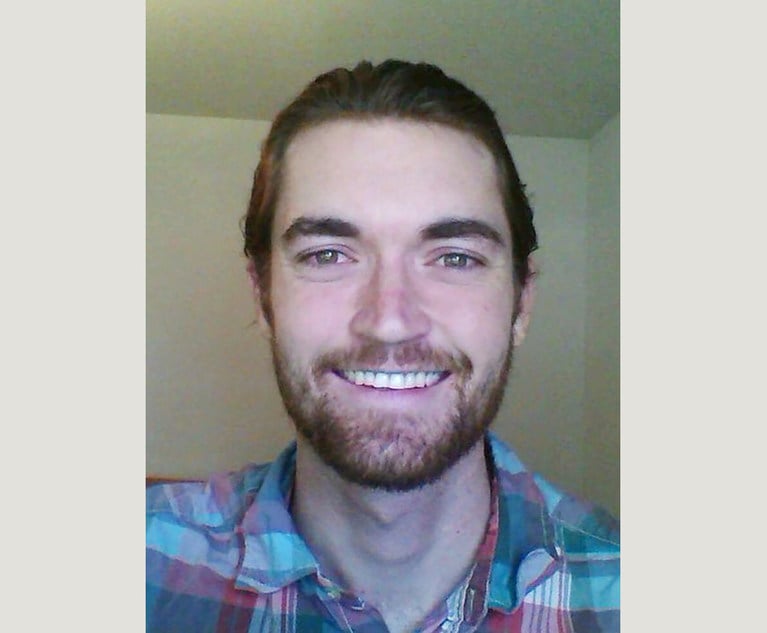McDonald Faces Conservative Opposition in Bid to Become Chief Justice
Opponents cite the nominee's close relationship with Gov. Dannel Malloy and his vote to throw out the state's death penalty.
February 07, 2018 at 02:15 PM
5 minute read

With hearings to confirm Connecticut Associate Justice Andrew McDonald as the new chief justice expected later this month, he may have to overcome hurdles tied to his resume and his close relationship with Democratic Gov. Dannel Malloy.
McDonald has a professional relationship with the governor that dates back to when Malloy was the Stamford mayor and McDonald was the corporation counsel. Some argue that McDonald should not be elevated to chief justice because he has no superior or appellate court experience, and say the friendship between Malloy and McDonald was the only reason the governor nominated him to replace retiring Chief Justice Chase Rogers.
One of McDonald's biggest critics is Republican gubernatorial candidate Timothy Herbst.
“In my opinion there is no gray area. You have excellent associate justices of the court that are just more qualified to be chief justice,” said Herbst, a former Trumbull first selectman. “If McDonald was not Malloy's best friend and [former] top political adviser, would we be having this conversation right now? Let's call this for what it is, and that is political patronage at its worst.”
Herbst continued: “If [former Republican Govs.] John Rowland or Jodi Rell appointed their chief legal counsel and best friend to the Supreme Court with no judicial experience, they would have been rightly criticized by the Democrats in the Legislature.”
McDonald, who is the second-longest serving associate justice currently on the bench with five years of experience, declined to be interviewed for this report. McDonald also practiced law for nearly three decades, and was a partner with Pullman & Comley.
Malloy's office did not immediately respond to requests for comment.
Another vocal voice in the conservative drumbeat against McDonald is Peter Wolfgang, executive director of the pro-life Family Institute of Connecticut.
Wolfgang said he is less concerned with McDonald's close relationship with Malloy, and more interested in how he's voted over the years.
Wolfgang cites two examples: McDonald's support as a state senator in 2009 for a bill that would have stripped Catholic bishops and priests of financial authority over their own churches, and his vote as a justice with the 4-3 majority to throw out the state's death penalty. The bill was eventually withdrawn.
“He seems to have a pattern of putting his own personal agenda above the law,” said Wolfgang, who added his organization launched an email campaign to pressure the Joint Committee on the Judiciary to reject McDonald.
At the time, Wolfgang said, some critics believed McDonald's support of the bill was payback for the church's opposition to same-sex marriage.
McDonald is openly gay, but Wolfgang, whose organization led the fight against same-sex marriage in the state, said the justice's sexual orientation has nothing to do with the opposition.
On the death penalty, both Herbst and Wolfgang said McDonald was chief legal counsel to Malloy, where he worked with the governor and legislators on language that ultimately repealed the death penalty.
“At the time, Malloy told us that the repeal would not apply to those already on death row, but only in cases going forward,” Herbst said. “Then, after the law passed, McDonald, while sitting on the Supreme Court, sits and hears a case on the murderers in the Cheshire home invasion case. … He should have recused himself due to his previous crafting of the legislation.”
McDonald has strong support among Democrats in the Legislature. That includes Sen. Terry Gerratana and Rep. Steven Stafstrom Jr., both members of the Joint Committee on the Judiciary.
“Justice McDonald's perspective and background working with people here in the Legislature and in the court system is solid,” Gerratana said.
Stafstrom, also an attorney with Pullman & Comley, took aim at Herbst's claim that McDonald was nominated because he is a close ally of Malloy.
“Justice McDonald has been serving as a distinguished member of the court for several years and it's insulting to say that an associate justice of the Supreme Court would be taking any direction from the governor,” Stafstrom said. “We have separations of power and the role of the judiciary is different from the executive branch of government.”
Stafstrom added he would have expected a gubernatorial candidate to know the justices don't take orders from the governor.
Stafstrom said concerns about issues like the death penalty “are fair areas of inquiry. They will be discussed during the public hearing process.” Stafstrom did not elaborate on the specific concerns on McDonald's record raised by Herbst and Wolfgang.
While hearings on McDonald's nomination are expected to begin later this month, a vote by the 45-member Joint Committee on the Judiciary on confirmation is not expected until March.
This content has been archived. It is available through our partners, LexisNexis® and Bloomberg Law.
To view this content, please continue to their sites.
Not a Lexis Subscriber?
Subscribe Now
Not a Bloomberg Law Subscriber?
Subscribe Now
NOT FOR REPRINT
© 2025 ALM Global, LLC, All Rights Reserved. Request academic re-use from www.copyright.com. All other uses, submit a request to [email protected]. For more information visit Asset & Logo Licensing.
You Might Like
View All
Settlement Allows Spouses of U.S. Citizens to Reopen Removal Proceedings
4 minute read
Judge Awards Over $350K in Attorney Fees in Data Breach Class Action Settlement
3 minute read
Silk Road Founder Ross Ulbricht Has New York Sentence Pardoned by Trump
3 minute read
Preparing for Change? These Leaders Have Already Done It. Plus, Managing Partner Survey Results
8 minute readTrending Stories
Who Got The Work
J. Brugh Lower of Gibbons has entered an appearance for industrial equipment supplier Devco Corporation in a pending trademark infringement lawsuit. The suit, accusing the defendant of selling knock-off Graco products, was filed Dec. 18 in New Jersey District Court by Rivkin Radler on behalf of Graco Inc. and Graco Minnesota. The case, assigned to U.S. District Judge Zahid N. Quraishi, is 3:24-cv-11294, Graco Inc. et al v. Devco Corporation.
Who Got The Work
Rebecca Maller-Stein and Kent A. Yalowitz of Arnold & Porter Kaye Scholer have entered their appearances for Hanaco Venture Capital and its executives, Lior Prosor and David Frankel, in a pending securities lawsuit. The action, filed on Dec. 24 in New York Southern District Court by Zell, Aron & Co. on behalf of Goldeneye Advisors, accuses the defendants of negligently and fraudulently managing the plaintiff's $1 million investment. The case, assigned to U.S. District Judge Vernon S. Broderick, is 1:24-cv-09918, Goldeneye Advisors, LLC v. Hanaco Venture Capital, Ltd. et al.
Who Got The Work
Attorneys from A&O Shearman has stepped in as defense counsel for Toronto-Dominion Bank and other defendants in a pending securities class action. The suit, filed Dec. 11 in New York Southern District Court by Bleichmar Fonti & Auld, accuses the defendants of concealing the bank's 'pervasive' deficiencies in regards to its compliance with the Bank Secrecy Act and the quality of its anti-money laundering controls. The case, assigned to U.S. District Judge Arun Subramanian, is 1:24-cv-09445, Gonzalez v. The Toronto-Dominion Bank et al.
Who Got The Work
Crown Castle International, a Pennsylvania company providing shared communications infrastructure, has turned to Luke D. Wolf of Gordon Rees Scully Mansukhani to fend off a pending breach-of-contract lawsuit. The court action, filed Nov. 25 in Michigan Eastern District Court by Hooper Hathaway PC on behalf of The Town Residences LLC, accuses Crown Castle of failing to transfer approximately $30,000 in utility payments from T-Mobile in breach of a roof-top lease and assignment agreement. The case, assigned to U.S. District Judge Susan K. Declercq, is 2:24-cv-13131, The Town Residences LLC v. T-Mobile US, Inc. et al.
Who Got The Work
Wilfred P. Coronato and Daniel M. Schwartz of McCarter & English have stepped in as defense counsel to Electrolux Home Products Inc. in a pending product liability lawsuit. The court action, filed Nov. 26 in New York Eastern District Court by Poulos Lopiccolo PC and Nagel Rice LLP on behalf of David Stern, alleges that the defendant's refrigerators’ drawers and shelving repeatedly break and fall apart within months after purchase. The case, assigned to U.S. District Judge Joan M. Azrack, is 2:24-cv-08204, Stern v. Electrolux Home Products, Inc.
Featured Firms
Law Offices of Gary Martin Hays & Associates, P.C.
(470) 294-1674
Law Offices of Mark E. Salomone
(857) 444-6468
Smith & Hassler
(713) 739-1250










